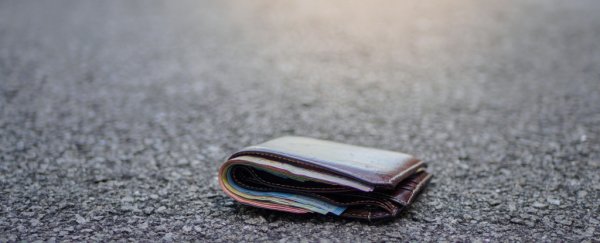In 2015, a Swiss graduate student departed from the Zurich airport with a suitcase filled with empty wallets, loads of cash and 400 spare keys. The authorities stopped him with questions. It was for a science experiment, he explained.
He was part of a team of behavioral researchers tackling two important questions: Do people around the world return lost wallets? And does the amount of cash in a wallet make a difference?
Members of the team traveled to 355 cities in 40 countries with suspicious baggage that carried more than 17,000 wallets.
Staff members of institutions such as museums, banks and police stations unknowingly became part of a global field experiment of civic honesty when they were presented with wallets that supposedly had been lost.
Regardless of country, people were more likely to try to return wallets with larger amounts of money inside, according to a new study published Thursday in Science.
This butts against long-standing economic models that predict people are more likely to be dishonest when the potential payout is larger.
The study shows people overwhelmingly see themselves as good people and seek to maintain that image, even if it overrides the impulse to get ahead, said psychologist Nina Mazar of Boston University, who has studied honesty in lab conditions.
The new study goes a step beyond her work by testing honesty in everyday life.
For each experiment, a young European tourist walked into a bank or another institution with a wallet containing a shopping list, a key and a few duplicate business cards written in the local language.
The tourist hands the wallet to a bank teller and, before quickly exiting, says: "I found this on the street near the entrance. Someone must have lost it. Can you take care of it?"
In some cases the teller would discover the wallet contained no money. In other cases there was US$15 in local currency. In some wealthier countries, some wallets had either no money, US$15 or almost US$100.
The tourists in these experiments, of course, were research assistants.
The fact that people were more likely to return wallets that included money (especially a lot of money) surprised the researchers. It also surprised the 300 top academic economists they surveyed, who predicted people would be more likely to keep the wallets with money.
"When a behavior is surprising, that's when you want to be cautious about over interpreting what this means for society," said Abigail Marsh, psychologist at Georgetown University, who was not involved in the study.
"But what I like about this study is that is supports so much of the data out there . . . that most people are trying to do the right thing most of the time."
2019 © The Washington Post
This article was originally published by The Washington Post.
